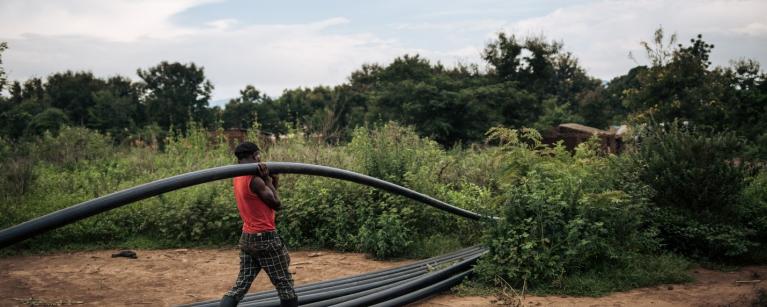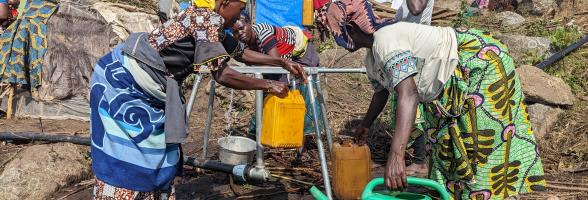The Democratic Republic of Congo (DRC) is one of the most water-rich countries in Africa, but millions of people have no access to drinking water and depend on unsafe sources, resulting in diseases such as cholera. The Fizi territory in South Kivu province is one of the most difficult regions to reach, with poor conditions and heavy rain making the roads inaccessible for days at a time. Furthermore, millions of people have been displaced by conflict, increasing demand for water in some areas and putting a strain on the few existing water supply infrastructures.
Feza Kashindi, a 79-year-old woman, has experienced many difficulties trying to find water in her village of Kananda: "I have ten children, but each one has already moved to their own homes, and I live alone. Finding water has been a major struggle in this village for many years. Even at my age, I would have to go down to the river to fetch water. It was dirty water, but there was no other choice - I drank it and used it to cook. In this village we would regularly get sick, and we knew what was causing it, but there was no other way of dealing with it. “
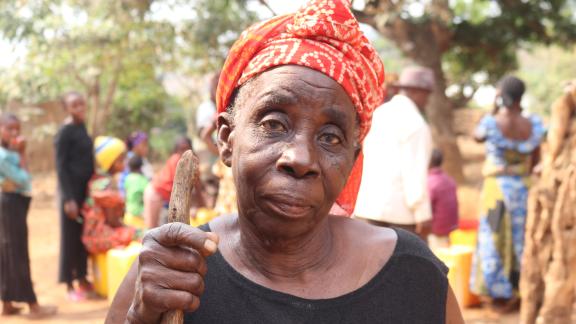
Mrs Feza Kashindi, a 79-year-old woman living in the village of Kananda in Fizi territory, describes finding drinking water as her greatest challenge. Photo Credit: Alexis Huguet/ Oxfam
Oxfam has been implementing a safe water and sanitation programme for communities affected by armed conflicts since 2017. These conflicts have led to the displacement of more than 80,000 people in Fizi territory. The project therefore aims to reduce the vulnerability and suffering of 132,352 vulnerable people who have suffered from a lack of access to drinking water, in an effort to protect them from diseases such as cholera, typhoid and diarrhoea.
Initially, the goal of the project was to build a 150 km long water supply system from a water source in the Mitumba mountains to provide drinking water to four villages (Malinde, Katanga, Sebele and Fizi centre).
By June 2019, 150 km had been built, and five water tanks and 172 taps had been installed, already providing water to more than 80,000 people in four villages.
As Oxfam was getting ready to leave the region, residents and members of the humanitarian community made a plea to Oxfam for the provision of drinking water to 18 other villages in serious need. This led to the Al-Thani Foundation agreeing to fund the extension of the project to the 18 other villages along the pipeline's main route. As a result, the pipeline was extended from 150 km to a total of 216 km, making it the longest water supply system ever built by Oxfam anywhere in the world. In addition, 229 standpipes have been installed, increasing the number of people served by the pipeline to 132,352.
The water supply benefits both the communities and, above all, the women, who all too often bear the burden of domestic chores.
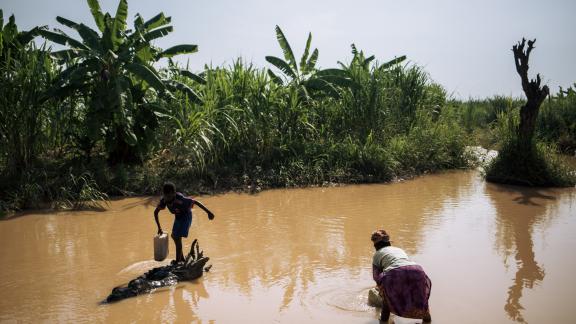
Woman and boy collecting water from a dirty river -Malinde. Photo Alexis Huguet/Oxfam
"When Oxfam first came here, it was a huge relief, we quickly started having access to drinking water. The standpipe here is 10 metres from my house, so I can fetch water in the morning and in the evening whenever I want, without even worrying about supply, because there's always enough," says Ms Kashindi. Oxfam has also worked with community groups in rural areas to raise awareness about safe hygiene practices. 271 volunteers from four health districts (Sebele, Umoja, Kananda and Bwala) have been identified and trained to mobilize families and groups in their neighbourhoods. Six youth clubs have been set up to encourage healthy hygiene practices. The project also provided family hygiene kits to 3,600 households in 18 communities or villages to improve their health conditions. The kits were distributed to households headed by women, children, the elderly, recently depressed people and people affected by cholera or diarrhoea.
Oxfam built 400 latrines, 200 showers and 400 washing stations in 18 communities or villages, each accommodating 50 people. The toilets and showers were designed in consultation with the project participants, and the communities were involved in picking the construction sites.
The water users' associations (ASUREP) manage water supply systems in semi-urban areas and large urban centres. They use a hybrid model that combines public and private management, formalising existing community management bodies and requiring legal and public representation. ASUREP relies on community payments rather than government support, particularly in rural and semi-urban areas. The greatest challenge has been persuading the population to pay for access to water, as paying for water will significantly increase maintenance of water systems, increase the proportion of people who pay for the service and, in some places, raise funds to expand the system. This approach has been applied in semi-urban localities: small towns and fast-growing areas. It has been welcomed by the government, which in turn has helped to influence policies at national level concerning water.
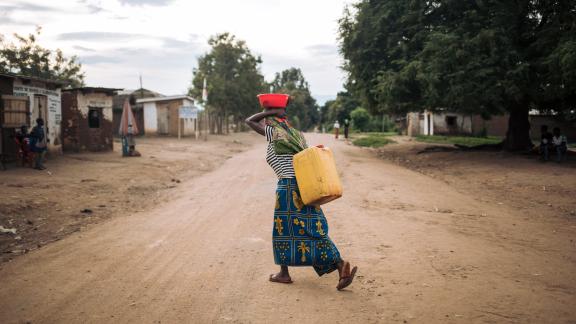
Rizini Furaha carrying water to her home. Photo Credit: Alexis Huguet/Oxfam
In spite of the challenges linked to access to drinking water in the Democratic Republic of Congo, Oxfam has successfully implemented a program to provide clean water and hygiene facilities to affected communities. Through the construction of a water supply system in Fizi territory, thousands of people now have access to a safe and sustainable water source, protecting them from deadly diseases such as cholera. In addition, Oxfam has worked closely with communities to raise awareness on the importance of hygiene practices, providing hygiene kits and building latrines and showers. The community management model used by the Water Users Associations (ASUREP) has also helped to ensure the long-term management and maintenance of the water supply infrastructure. Despite the ongoing challenges, these efforts are helping to improve the lives of vulnerable communities in the DRC, particularly women, who are often burdened with water-related household chores.
The positive impact of the project on her community is evident to Mrs Kashindi: "We no longer experience stomach aches and diarrhoea. My wish is that there will always be water in all the villages surrounding us, because with the influx of people, there's a risk of long queues in the days to come. I also fear that the situation will become more complex once Oxfam leaves."
